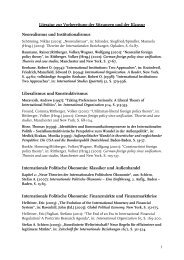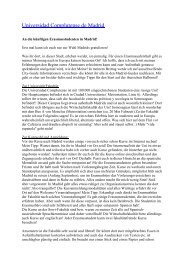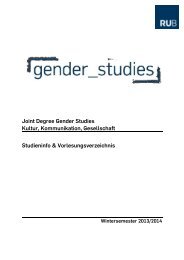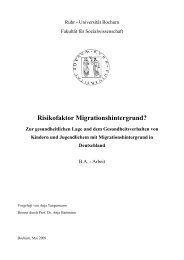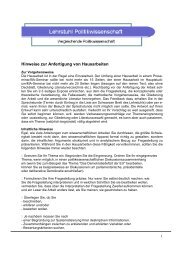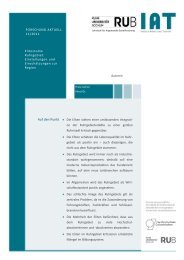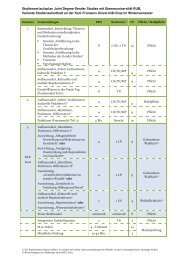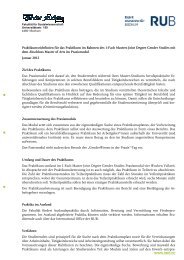View - Fakultät für Sozialwissenschaft der Ruhr-Universität Bochum
View - Fakultät für Sozialwissenschaft der Ruhr-Universität Bochum
View - Fakultät für Sozialwissenschaft der Ruhr-Universität Bochum
Create successful ePaper yourself
Turn your PDF publications into a flip-book with our unique Google optimized e-Paper software.
Wilkesmann/Rascher self-governance and slowness page 5<br />
knowledge management, I’m not interested in sharing my knowledge. I expect rewards for<br />
my willingness to share my knowledge.<br />
A company's survival is dependent on the development new knowledge, but from the point of<br />
view of each employee it is rational that other employees pay for the costs of creating<br />
knowledge. From "ego's" perspective it is rational to invest nothing in the creation of<br />
knowledge, if "alter" freely ren<strong>der</strong>s his information and is highly engaged in developing new<br />
knowledge. Thus when all others are cooperating, ego declines to help. The first condition of<br />
a n-person-prisoner-dilemma is fulfilled [D (n) > C (n) ] 3 . The second condition [C (n-1) > D (0) ] is<br />
fulfilled as well, because ego is not able to produce profit, if nobody develops new<br />
knowledge. The company will drop out of the market and ego will lose his job. Thus it is<br />
rational for ego to cooperate, if n-1 employees cooperate, too. As a result, the third condition<br />
[D (n) > D (0) ] is fulfilled as well, because the loss caused by the defecting of all employees in<br />
the process of creating new knowledge is greater than when only a few employees are<br />
cooperating.<br />
1.1 How is it possible to overcome the prisoner’s dilemma?<br />
Traditionally, there are two ways to overcome the prisoner’s dilemma: either a third actor<br />
rearranges the game by placing selective incentives (e.g. Hobbes), or the cooperative strategy<br />
is stabilized internally.<br />
In the case of knowledge development the prisoner’s dilemma cannot be overcome by<br />
selective incentives (Osterloh/Frost/Rota 2001). The basic problem is that the development of<br />
new knowledge cannot be perceived from an external point of view. If a third actor is not able<br />
to monitor the process, he will not offer a reward with selective incentives. The second reason<br />
is the problem of multiple tasking. In working processes with complex problems all<br />
employees have to fulfil a lot of tasks. Every selective incentive rewards only one task. A<br />
rational actor will then only complete that single task, all other tasks will be neglected<br />
(Frey/Osterloh 2002). On the other hand it is not possible to assign a lot of incentives. It is too<br />
complex and every action will then be rewarded.<br />
3<br />
The N-individuals-prisoner's dilemma is defined by the following three conditions:<br />
(1) D (n) > C (n)<br />
(2) C (n-1) > D (0)<br />
(3) D (n) > D (0)<br />
D and C are Ego's chosen strategies (defection or cooperation). The number of<br />
cooperative individuals is given in brackets. The inequations reflect the utility relations<br />
from Ego's point of view.<br />
5



